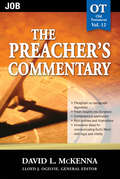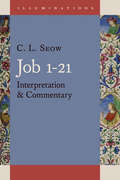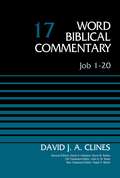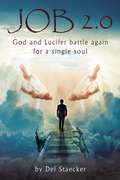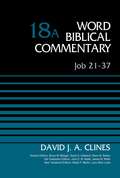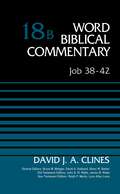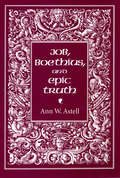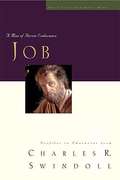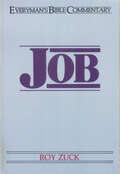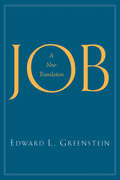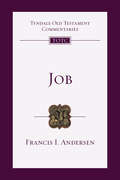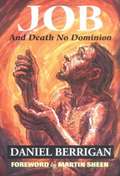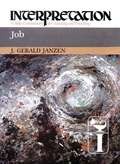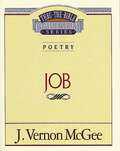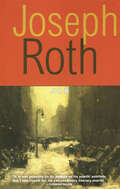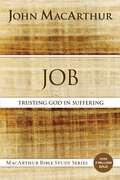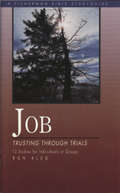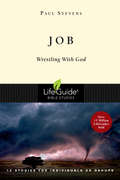- Table View
- List View
Job (The Preacher's Commentary)
by David MckennaGeneral editor Lloyd J. Ogilvie brings together a team of skilled and exceptional communicators to blend sound scholarship with life-related illustrations.The design for the Preacher's Commentary gives the reader an overall outline of each book of the Bible. Following the introduction, which reveals the author's approach and salient background on the book, each chapter of the commentary provides the Scripture to be exposited. The New King James Bible has been chosen for the Preacher's Commentary because it combines with integrity the beauty of language, underlying Hebrew and Greek textual basis, and thought-flow of the 1611 King James Version, while replacing obsolete verb forms and other archaisms with their everyday contemporary counterparts for greater readability. Reverence for God is preserved in the capitalization of all pronouns referring to the Father, Son, or Holy Spirit. Readers who are more comfortable with another translation can readily find the parallel passage by means of the chapter and verse reference at the end of each passage being exposited. The paragraphs of exposition combine fresh insights to the Scripture, application, rich illustrative material, and innovative ways of utilizing the vibrant truth for his or her own life and for the challenge of communicating it with vigor and vitality.
Job 1 - 21: Interpretation and Commentary
by C. L. SeowThe Hebrew book of Job is by all accounts an exquisite piece of literary art that holds its rightful place among the most outstanding compositions in world literature. Yet it is also widely recognized as an immensely difficult text to understand.In elucidating that ancient text, this inaugural Illuminations commentary by C. L. Seow pays close attention to the reception history of Job, including Jewish, Muslim, Christian, and Western secular interpretations as expressed in theological, philosophical, and literary writings and in the visual and performing arts. Seow offers a primarily literary-theological interpretation of Job, a new translation, and detailed commentary.
Job 1-20, Volume 17
by Ralph P. Martin David Allen Hubbard Glenn W. Barker John D. Watts David J. ClinesThe Word Biblical Commentary delivers the best in biblical scholarship, from the leading scholars of our day who share a commitment to Scripture as divine revelation. This series emphasizes a thorough analysis of textual, linguistic, structural, and theological evidence. The result is judicious and balanced insight into the meanings of the text in the framework of biblical theology. These widely acclaimed commentaries serve as exceptional resources for the professional theologian and instructor, the seminary or university student, the working minister, and everyone concerned with building theological understanding from a solid base of biblical scholarship.Overview of Commentary OrganizationIntroduction—covers issues pertaining to the whole book, including context, date, authorship, composition, interpretive issues, purpose, and theology.Each section of the commentary includes:Pericope Bibliography—a helpful resource containing the most important works that pertain to each particular pericope.Translation—the author’s own translation of the biblical text, reflecting the end result of exegesis and attending to Hebrew and Greek idiomatic usage of words, phrases, and tenses, yet in reasonably good English.Notes—the author’s notes to the translation that address any textual variants, grammatical forms, syntactical constructions, basic meanings of words, and problems of translation.Form/Structure/Setting—a discussion of redaction, genre, sources, and tradition as they concern the origin of the pericope, its canonical form, and its relation to the biblical and extra-biblical contexts in order to illuminate the structure and character of the pericope. Rhetorical or compositional features important to understanding the passage are also introduced here.Comment—verse-by-verse interpretation of the text and dialogue with other interpreters, engaging with current opinion and scholarly research.Explanation—brings together all the results of the discussion in previous sections to expose the meaning and intention of the text at several levels: (1) within the context of the book itself; (2) its meaning in the OT or NT; (3) its place in the entire canon; (4) theological relevance to broader OT or NT issues.General Bibliography—occurring at the end of each volume, this extensive bibliographycontains all sources used anywhere in the commentary.
Job 2.0: God and Lucifer battle again for a single soul
by Del StaeckerGod and Lucifer are at it again! More than three millennia after their first contest, the creator of the Universe and his highest errant minion are struggling once again over the fate of a single soul. For this battle the center of their attention is not God’s most favored servant. Rather it is an everyday person. What could this rematch mean for human kind when a nobody is in Lucifer’s crosshairs? More importantly, what does it mean for you?JOB 2.0 is an updated retelling of JOB, the oldest book in the Bible. It takes place in modern times, using every-day language and ordinary life situations. Lucifer challenges God to another test of one of God’s faithful. Lucifer chooses Jake (Jacob Osborne Brown, Junior, or JOB II), who loses everything in the course of the challenge. To rid himself of his old life and the values it reflected, Jake has a yard sale, during which his neighbors and friends stop by to provide their insights into why his life fell apart. Through seven conversations, and interjections from God and Lucifer, the characters share insights into the nature of God, the definition of evil, an explanation of sin, the role of choice in one’s life, the recognition of individual responsibility, the sovereignty of God, the importance of faith, the power of prayer, the comfort of faith, and the search for spiritual truth.In the last conversation, Jake has the opportunity to ask God all the questions he wants answered. God provides the understanding Jake seeks, explaining the relationship between God and humans, our purpose, the nature of love, the importance of repentance, and finally, (re)unification with Himself.JOB 2.0 explains our relationship with God in a truly humorous manner yet is not preachy. Instead, it encourages self-examination and rigorous thought while being utterly entertaining. It is perfect for young adults as well as mature readers; it is appropriate for unchurched as well as churched populations; it is perfect for those seeking meaning in their lives as well as those who have defined their spiritual life. It is perfect for gift-giving anytime, but especially for coming-of-age and other life-stage moments, as well as during traditional gift-giving holidays.One reader described it as, “Funny, yet deep and serious. The relationship between God, Job and Lucifer are pure imagination and done so well.” Another reader said, “I love how it manages to offer fresh illumination with Lucifer challenging God and Logic in every conceivable way until we are left to get to the heart of IT ALL. This is great, and a pleasure to read!”
Job 21-37, Volume 18A
by Bruce M. Metzger Ralph P. Martin Lynn Allan Losie David Allen Hubbard Glenn W. Barker John D. Watts James W. Watts David J. ClinesThe Word Biblical Commentary delivers the best in biblical scholarship, from the leading scholars of our day who share a commitment to Scripture as divine revelation. This series emphasizes a thorough analysis of textual, linguistic, structural, and theological evidence. The result is judicious and balanced insight into the meanings of the text in the framework of biblical theology. These widely acclaimed commentaries serve as exceptional resources for the professional theologian and instructor, the seminary or university student, the working minister, and everyone concerned with building theological understanding from a solid base of biblical scholarship. <p><p>Overview of Commentary OrganizationIntroduction—covers issues pertaining to the whole book, including context, date, authorship, composition, interpretive issues, purpose, and theology.Each section of the commentary includes:Pericope Bibliography—a helpful resource containing the most important works that pertain to each particular pericope.Translation—the author’s own translation of the biblical text, reflecting the end result of exegesis and attending to Hebrew and Greek idiomatic usage of words, phrases, and tenses, yet in reasonably good English.Notes—the author’s notes to the translation that address any textual variants, grammatical forms, syntactical constructions, basic meanings of words, and problems of translation.Form/Structure/Setting—a discussion of redaction, genre, sources, and tradition as they concern the origin of the pericope, its canonical form, and its relation to the biblical and extra-biblical contexts in order to illuminate the structure and character of the pericope. <p>Rhetorical or compositional features important to understanding the passage are also introduced here.Comment—verse-by-verse interpretation of the text and dialogue with other interpreters, engaging with current opinion and scholarly research.Explanation—brings together all the results of the discussion in previous sections to expose the meaning and intention of the text at several levels: (1) within the context of the book itself; (2) its meaning in the OT or NT; (3) its place in the entire canon; (4) theological relevance to broader OT or NT issues.General Bibliography—occurring at the end of each volume, this extensive bibliography contains all sources used anywhere in the commentary.
Job 38-42, Volume 18B (Word Biblical Commentary)
by Bruce M. Metzger Ralph P. Martin Lynn Allan Losie David Allen Hubbard Glenn W. Barker John D. Watts James W. Watts David J. ClinesThe Word Biblical Commentary delivers the best in biblical scholarship, from the leading scholars of our day who share a commitment to Scripture as divine revelation. This series emphasizes a thorough analysis of textual, linguistic, structural, and theological evidence. The result is judicious and balanced insight into the meanings of the text in the framework of biblical theology. These widely acclaimed commentaries serve as exceptional resources for the professional theologian and instructor, the seminary or university student, the working minister, and everyone concerned with building theological understanding from a solid base of biblical scholarship. <P><P>Overview of Commentary OrganizationIntroduction—covers issues pertaining to the whole book, including context, date, authorship, composition, interpretive issues, purpose, and theology.Each section of the commentary includes:Pericope Bibliography—a helpful resource containing the most important works that pertain to each particular pericope.Translation—the author’s own translation of the biblical text, reflecting the end result of exegesis and attending to Hebrew and Greek idiomatic usage of words, phrases, and tenses, yet in reasonably good English.Notes—the author’s notes to the translation that address any textual variants, grammatical forms, syntactical constructions, basic meanings of words, and problems of translation. <P>Form/Structure/Setting—a discussion of redaction, genre, sources, and tradition as they concern the origin of the pericope, its canonical form, and its relation to the biblical and extra-biblical contexts in order to illuminate the structure and character of the pericope. Rhetorical or compositional features important to understanding the passage are also introduced here.Comment—verse-by-verse interpretation of the text and dialogue with other interpreters, engaging with current opinion and scholarly research.Explanation—brings together all the results of the discussion in previous sections to expose the meaning and intention of the text at several levels: (1) within the context of the book itself; (2) its meaning in the OT or NT; (3) its place in the entire canon; (4) theological relevance to broader OT or NT issues.General Bibliography—occurring at the end of each volume, this extensive bibliographycontains all sources used anywhere in the commentary.
Job for Everyone
by John GoldingayThis volume in the Old Testament for Everyone series covers one of the most popular books of the Old Testament, a book known for its themes of suffering and doubt. Taking the form of a play, with different characters relating different themes, the book of Job tells the story of one man whose life fell apart, who went to the depths and questioned God, and whose life was eventually rebuilt. Goldingay's careful and compelling commentary explores the book of Job's enduring message and is perfect for daily devotion, Sunday school preparation, or brief visits with the Bible.
Job's Niece (Grace Livingston Hill Series #54)
by Grace Livingston HillLovely young Doris Dunbar's life was a series of struggles. One after another they came, just as they had come to Job in ancient times. Even Milton Page, her loyal fiancé, failed her when she needed him most. But Job had a comforter, and so had Doris--two of them, in fact, for Angus Macdonald could not easily forget her wistful, troubled eyes. Then, just as it looked for one terrible moment as if even these comforts were to be swept away, Doris found a happiness so magnificent, so wonderful, it quite took her breath away." Like other Grace Livingston Hill novels, the author pens her story within a Christian context.
Job, Boethius, and Epic Truth
by Ann W. AstellCalling into question the common assumption that the Middle Ages produced no secondary epics, Ann W. Astell here revises a key chapter in literary history. She examines the connections between the Book of Job and Boethius' s Consolation of Philosophy—texts closely associated with each other in the minds of medieval readers and writers—and demonstrates that these two works served as a conduit for the tradition of heroic poetry from antiquity through the Middle Ages and into the Renaissance. As she traces the complex influences of classical and biblical texts on vernacular literature, Astell offers provocative readings of works by Dante, Chaucer, Spenser, Malory, Milton, and many others.Astell looks at the relationship between the historical reception of the epic and successive imitative forms, showing how Boethius's Consolation and Johan biblical commentaries echo the allegorical treatment of" epic truth" in the poems of Homer and Virgil, and how in turn many works classified as "romance" take Job and Boethius as their models. She considers the influences of Job and Boethius on hagiographic romance, as exemplified by the stories of Eustace, Custance, and Griselda; on the amatory romances of Abelard and Heloise, Dante and Beatrice, and Troilus and Criseyde; and on the chivalric romances of Martin of Tours, Galahad, Lancelot, and Redcrosse. Finally, she explores an encyclopedic array of interpretations of Job and Boethius in Milton's Paradise Lost, Paradise Regained, and Samson Agonistes.
Job, a Man of Heroic Endurance
by Charles R. Swindollthe ancient story of Job offers timeless truth for us if we'll only listen. Now, in this illuminating study of Job's life, Charles Swindoll, in his trademark warm and insightful style, helps readers understand the key to developing heroic endurance.
Job- Everyman's Bible Commentary: Selected Studies On The Book Of Job (Everyman's Bible Commentaries)
by Roy ZuckUnfathomable loss. Unmerited suffering. Why is this happening to me? For centuries people have tried to understand the reasons for suffering and grief. When we cannot connect our woes to wrongs we have done, we conclude that our suffering is undeserved and unfair. Like Job, we struggle to understand our pain.The universality of suffering makes the book of Job appealing, but the treatment of that theme often makes the book difficult to comprehend. Nonetheless, this section of Scripture offers powerful lessons for your life.Dr. Roy Zuck directs his commentary toward the layman. His clear, organized insights can reveal important truths for the struggling Christian. The uncomplicated, outlined content is suitable for both individual and group study. You can learn from Job's suffering--as well as from your own.
Job- Everyman's Bible Commentary: Selected Studies On The Book Of Job (Everyman's Bible Commentaries)
by Roy ZuckUnfathomable loss. Unmerited suffering. Why is this happening to me? For centuries people have tried to understand the reasons for suffering and grief. When we cannot connect our woes to wrongs we have done, we conclude that our suffering is undeserved and unfair. Like Job, we struggle to understand our pain.The universality of suffering makes the book of Job appealing, but the treatment of that theme often makes the book difficult to comprehend. Nonetheless, this section of Scripture offers powerful lessons for your life.Dr. Roy Zuck directs his commentary toward the layman. His clear, organized insights can reveal important truths for the struggling Christian. The uncomplicated, outlined content is suitable for both individual and group study. You can learn from Job's suffering--as well as from your own.
Job: A New Translation
by Edward L. GreensteinThis revelatory new translation of Job by one of the world’s leading biblical scholars will reshape the way we read this canonical text The book of Job has often been called the greatest poem ever written. The book, in Edward Greenstein’s characterization, is “a Wunderkind, a genius emerging out of the confluence of two literary streams” which “dazzles like Shakespeare with unrivaled vocabulary and a penchant for linguistic innovation.” Despite the text’s literary prestige and cultural prominence, no English translation has come close to conveying the proper sense of the original. The book has consequently been misunderstood in innumerable details and in its main themes. Edward Greenstein’s new translation of Job is the culmination of decades of intensive research and painstaking philological and literary analysis, offering a major reinterpretation of this canonical text. Through his beautifully rendered translation and insightful introduction and commentary, Greenstein presents a new perspective: Job, he shows, was defiant of God until the end. The book is more about speaking truth to power than the problem of unjust suffering.
Job: An Introduction And Commentary (Tyndale Old Testament Commentaries #Volume 14)
by Francis I. AndersenFor Francis Andersen, the Old Testament book about Job is one of the supreme offerings of the human mind to the living God, and one of the best gifts of God to humanity. "The task of understanding it is as rewarding as it is strenuous. . . . One is constantly amazed at its audacious theology and at the magnitude of its intellectual achievement. Job is a prodigious book in the vast range of its ideas, in its broad coverage of human experience, in the intensity of its passion, in the immensity of its concept of God, and not least in its superb literary craftsmanship. . . . From one man's agony it reaches out to the mystery of God, beyond words and explanations." The original, unrevised text of this volume has been completely retypeset and printed in a larger, more attractive format with the new cover design for the series. These commentaries are designed to help the reader of the Bible understand what the text says and what it means. The Introduction to each book gives a concise but thorough treatment of its authorship, date, original setting and purpose. Following a structural Analysis, the Commentary takes the book section by section, drawing out its main themes, and also comments on individual verses and problems of interpretation. Additional Notes provide fuller discussion of particular difficulties. The goal throughout is to explain the true meaning of the Bible and make its message plain.
Job: And Death No Dominion
by Daniel BerriganBerrigan uses the story of Job to ignite our religious imagination and show us the way to effective protest and true faith. Continuing his series of live reflections on Scripture, he inspires us to action and assures us of God's fidelity.
Job: Interpretation (A Bible Commentary for Teaching and Preaching)
by J. Gerald JanzenIn this volume, J. Gerald Janzen examines the text of the book of Job as a literary text within the context of the history of the religion of Israel and within the broader context of the universal human condition. He approaches the basic character of the book from a literary perspective which enables him to identify human existence as exemplified in Job and to expound on the mystery of good and evil, which gives human existence its experiential texture and which together drive humans to ask the same kind of questions asked by Job. This is the first full-length commentary to present Job systematically and literarily.
Job: Poetry (Thru the Bible #16)
by J. Vernon McgeeRadio messages from J. Vernon McGee delighted and enthralled listeners for years with simple, straightforward language and clear understanding of the Scripture. Now enjoy his personable, yet scholarly, style in a 60-volume set of commentaries that takes you from Genesis to Revelation with new understanding and insight. Each volume includes introductory sections, detailed outlines and a thorough, paragraph-by-paragraph discussion of the text. A great choice for pastors - and even better choice for the average Bible reader and student! Very affordable in a size that can go anywhere, it's available as a complete 60-volume series, in Old Testament or New Testament sets, or individually.
Job: The Story of A Simple Man
by Joseph RothAn Orthodox Jew’s faith is tested when he leaves Tsarist Russia for NYC in this retelling of the Book of Job—“inspired in its poetry and its deep insight” (The New York Times).Job is the tale of Mendel Singer, a pious Eastern-European Jew who teaches the Torah to children, and whose faith is tested at every turn. His youngest son seems to be incurably disabled, one of his older sons joins the Russian Army, the other deserts to America, and his daughter is running around with a Cossack. When he flees with his wife and daughter, further blows of fate await him . . . In this modern fable based on the biblical story of Job, Mendel Singer witnesses the collapse of his world, experiences unbearable suffering and loss, and ultimately gives up hope and curses God, only to be saved by a miraculous reversal of fortune.
Job: Trusting God in Suffering (MacArthur Bible Studies)
by John F. MacArthurThe events that occur in the book of Job present readers with a profound question: "Why do the righteous suffer?" Although a direct answer to this question seems important, the book of Job does not set forth such a response. Job never learned the reasons for his suffering. In fact, when God finally confronted Job, he could only put his hand over his mouth and say nothing. His silence underscores the importance of trusting God's purposes in the midst of suffering, because suffering—like all other human experiences—is directed by perfect divine wisdom.In this study, pastor John MacArthur will guide you through an in-depth look at the defining themes and interpretative challenges in Job. Studies include close-up examinations of doctrinal themes such as God's Justice and "A Discourse on Human Frailty."—ABOUT THE SERIES—The MacArthur Bible Study series is designed to help you study the Word of God with guidance from widely respected pastor and author John MacArthur. Each guide provides intriguing examinations of the whole of Scripture by examining its parts and incorporates:Extensive, but straight-forward commentary on the text.Detailed observations on overriding themes, timelines, history, and context.Word and phrase studies to help you unlock the broader meaning and apply it to your life.Probing, interactive questions with plenty of space to write down your response and thoughts.
Job: Trusting Through Trials (Fisherman Bible Studyguide Series)
by Ronald KlugWhy Do Good People Suffer? Why, God? why has this happened to me? How can I make sense out of my life? The book of Job wrestles with the deep personal questions that confront us as we face illness, loss, disappointment, suffering and death. And it calls us to faith in the God of strength and love who cares for us in the midst of our suffering.
Job: Wrestling with God (LifeGuide Bible Studies)
by R. Paul StevensWhy do faithful people suffer? Job wanted to know. So he demanded an answer from God. His friends thought he was crazy, but Job persisted. And, finally, God answered. As Paul Stevens leads you through twelve-session LifeGuide Bible Study, Job's questions and God's answers, you discover comfort, hope and meaning for the suffering in your own life. This revised LifeGuide Bible Study features additional questions for starting group discussions and for meeting God in personal reflection, together with expanded leader's notes and a "Now or Later" section in each study. For over three decades LifeGuide Bible Studies have provided solid biblical content and raised thought-provoking questions���making for a one-of-a-kind Bible study experience for individuals and groups. This series has more than 130 titles on Old and New Testament books, character studies, and topical studies. PDF download with a single-user license; available from InterVarsity Press and other resellers.
Joe Salsberg
by Gerald TulchinskyThis book follows the life and intellectual journey of Joseph Baruch Salsberg, a Polish-Jewish immigrant who became a major figure of the Ontario Left, a leading voice for human rights in the Ontario legislature, and an important journalist in the Jewish community. His life trajectory mirrored many of the most significant transformations in Canadian political and social life in the twentieth century.Award-winning historian Gerald Tulchinsky traces Salsberg's personal and professional journey - from his entrance into Toronto's oppressive garment industry at age 14, which led to his becoming active in emerging trade unions, to his rise through the ranks of the Communist Party of Canada and the Workers' Unity League. Detailing Salsberg's time as an influential Toronto alderman and member of the Ontario legislature, the book also examines his dramatic break with communism and his embrace of a new career in journalism.Tulchinsky employs historical sources not used before to explain how Salsberg's family life and surrounding religious and social milieu influenced his evolution as a Zionist, an important labour union leader, a member of the Communist Party of Canada, and a prominent member of Toronto's Jewish community.
Joel
by Gregg Lewis Joel SonnenbergJoel Sonnenberg solo tenía dos años cuando un camión de dieciocho ruedas chocó contra el auto de su familia. En el infierno que siguió su cuerpo se quemó en más de un ochenta y cinco por ciento. Esta es su historia como solo él puede contarla. Experimente el mundo desde la perspectiva de Joel, mientras lo lleva a una travesía personal con más trama que una película de Hollywood. Su vida ha sido de grandes logros y sufrimientos. Prepárese para enamorarse de este joven llamado Joel.
Joel
by Joel SonnenbergJoel Sonnenberg was only two years old when an 18-wheeler smashed into his family&’s car. In the inferno that followed, he was burned on over 85 percent of his body. This is his story as only he can tell it. Experience the world from Joel&’s perspective as he takes you on a personal journey with more twists and turns than a Hollywood movie. It&’s been a life of both great struggles and of tremendous achievement and honor. Yet Joel asserts, &“I am just an ordinary person whom people find extraordinary.&” Be prepared to fall in love with a young man named Joel. We have known Joel since he first moved to Montreat, North Carolina, eighteen years ago. What an incredible boy he was; what an incredible man he has become. His testimony will stir your heart and forever change you. Ruth and Billy Graham Joel is a dear friend. His story is truly remarkable. I encourage everyone to read it. It is truly inspiring! Coach Mike Krzyzewski, Head Coach, Duke University Basketball Joel is an American hero. True courage is demonstrated in every page. Bob Dole, Former United States Senator, Kansas The dictionary doesn&’t have enough adjectives to describe my love and admiration for Joel Sonnenberg. To spend time with Joel—whether in his book, at a soccer game, or over a soda—is to come away a different person simply because you&’ve been with him. Joni Eareckson Tada, Founder and CEO of Joni and Friends Joel Sonnenberg&’s story is more than just an uplifting tale of persistence and achievement. Rooted in tragedy, it&’s the story of a mother&’s love, a boy&’s courage, and the resilience of the human spirit. Bryant Gumbel, Television News Journalist His story is one all young people need to hear . . . optimistic, confident, and filled with faith. Dr. Jay Kesler, President Emeritus, Taylor University
